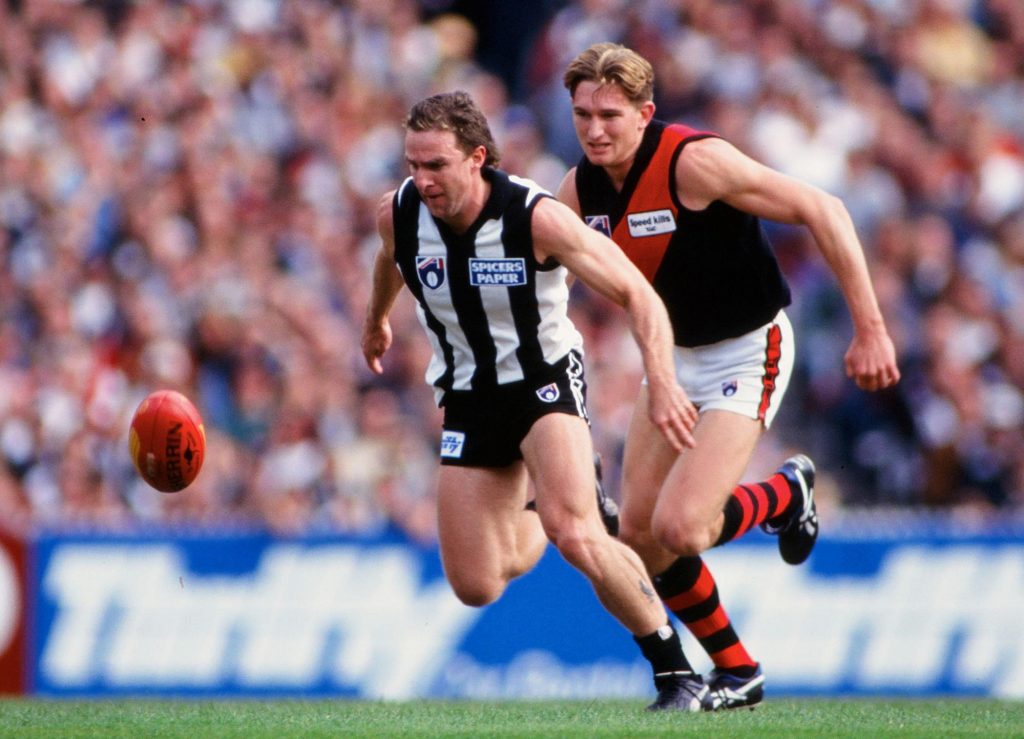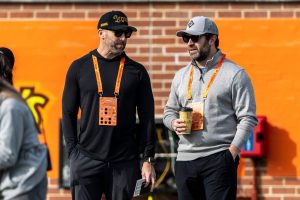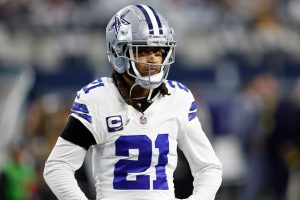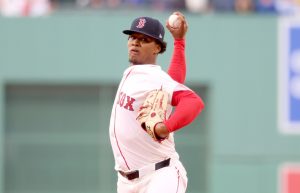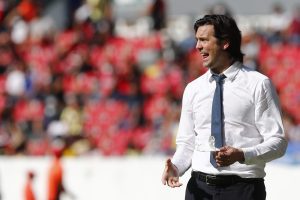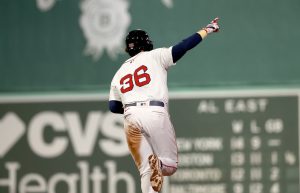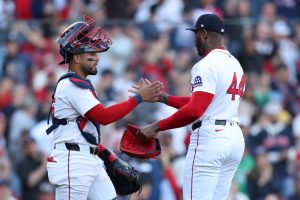
Footy is full of soldiers who never found a war and on the 80th anniversary of the Gallipoli landings, one of them was asleep in the birthing ward. Dermott Brereton was barrel-chested, chicken-legged, born for the big occasion and, on this day, a new father. He fused Frankston street smarts with Glenferrie conservatism; morning television affability with an Irish thirst for vengeance. At 30, his body was at war with itself. But as police escorted the team bus to the MCG for the inaugural Anzac Day game between Collingwood and Essendon, he heard the bugle call.
His apprentice that day was a mild-mannered discus thrower from Reservoir. A fortnight earlier, Saverio Rocca was playing in the reserves. “He was just a nice, well groomed, well cared for Italian boy whose mum probably cooked his dinner every night of his life,” Brereton later said. He was constantly in Big Sav’s ear that day – blocking, encouraging, gesticulating, cajoling. Rocca had the game of his life, and Brereton hasn’t stopped talking since.
James Hird was a civil engineering student. When he first arrived at Essendon, they thought he was anaemic. He was a phenomenal player, but he was a worrier. Before big games, he’d manage a few hours sleep at best. On this day, he was well held by Gavin Crosisca. But with scores level and two minutes remaining, he slunk through a hole – “weaving through bodies in a forward pocket like a motorcycle between trucks,” the author Andrew Mueller wrote years later – and threaded what remains one of the great Anzac Day goals.
Moments later, something happened that would change the sport for ever. Damian Monkhorst, the grandson of a Dutch missionary, was an edentulate plumber from Woori Yallock. On his way to the 1990 grand final, he was doing burnouts on the Maroondah Highway. On Anzac Day five years later, with his team trailing by a goal, he hatched a dead ball, wrapped up by two Indigenous players in Michael Long and Che Cockatoo-Collins, and shouted a racial slur.
Long was a man to be reckoned with. He sought an apology along with major and meaningful change. But the AFL shilly shallied for a fortnight and the initial mediation left him fuming. “You took it the wrong way, mate,” Monkhorst told him. The Collingwood ruck later apologised, and the AFL eventually implemented a racial and religious vilification code. “Without so much as raising his voice,” Martin Flanagan wrote, “Michael Long bent the AFL to his will.”
Nathan Buckley was the son of a man who’d fought in some of the fiercest battles in the Vietnam war. At that point in his career, he put so much pressure on himself, he would often burst into tears in the middle of a training drill. He played a magnificent game that April afternoon, and with seconds remaining, he rampaged through the middle of the MCG. Brereton was on his own, 30 metres out, directly in front. But the gravitational draw of Rocca was too great, and Buckley deviated off his line. The young forward was triple teamed, the ball was cleared, and the game was drawn.
So many of the players in that game had a significant impact on the sport. Five would become senior AFL coaches, even with Mark Thompson out injured on the day. Three would win Brownlow medals, just as many would be awarded Norm Smith medals. Others would become club CEOs, board members, commentators, match reviews officers, umpires, even gridiron players. One, Chris Curran, died in a car accident in 2018, aged just 44.
In his book, the Magpies coach Leigh Matthews remembered it as one of the best games he had ever seen. A squeaky-voiced introvert off the field, a stone-cold killer on it, and a detached pragmatist in the coaches box, Matthews was a far harsher and frustrated figure in 1995 than in his later years at Brisbane. Incredibly, he made the Collingwood players sing the club song in the rooms afterwards.
Footy had long been played on Anzac Day – 92,000 people saw Collingwood beat Richmond in 1977. But it was Matthews’ opposite number who helped secure the game’s legacy. Autodidactic and gnomic; a cloud dweller and a street fighter, the Bombers coach Kevin Sheedy nurtured the annual fixture, promoted it, and always pushed back on the martial overreach. To his credit, he backed Long every step of the way.
In the decades following the 1995 Anzac Day game, a lot of silly things were said, and a lot of tired analogies were drawn.But in recent years, a better balance has been struck. Despite the overkill and the commercialisation, to remove your hat and stand with nearly 100,000 humans is an experience like few others. A couple of years ago, the MCG was as silent as a cemetery. There were two sounds only – the Australian, New Zealand and Aboriginal and Torres Strait Islander flags flapping at half-mast, and a single baby crying. It was a reminder of how sport, when it knows its place, can still move and bind us.
-
This is an extract from Guardian Australia’s free weekly AFL email, From the Pocket. To get the full version, just visit this page and follow the instructions
Footy is full of soldiers who never found a war and on the 80th anniversary of the Gallipoli landings, one of them was asleep in the birthing ward. Dermott Brereton was barrel-chested, chicken-legged, born for the big occasion and, on this day, a new father. He fused Frankston street smarts with Glenferrie conservatism; morning television affability with an Irish thirst for vengeance. At 30, his body was at war with itself. But as police escorted the team bus to the MCG for the inaugural Anzac Day game between Collingwood and Essendon, he heard the bugle call.
His apprentice that day was a mild-mannered discus thrower from Reservoir. A fortnight earlier, Saverio Rocca was playing in the reserves. “He was just a nice, well groomed, well cared for Italian boy whose mum probably cooked his dinner every night of his life,” Brereton later said. He was constantly in Big Sav’s ear that day – blocking, encouraging, gesticulating, cajoling. Rocca had the game of his life, and Brereton hasn’t stopped talking since.
Advertisement
Advertisement
Advertisement
James Hird was a civil engineering student. When he first arrived at Essendon, they thought he was anaemic. He was a phenomenal player, but he was a worrier. Before big games, he’d manage a few hours sleep at best. On this day, he was well held by Gavin Crosisca. But with scores level and two minutes remaining, he slunk through a hole – “weaving through bodies in a forward pocket like a motorcycle between trucks,” the author Andrew Mueller wrote years later – and threaded what remains one of the great Anzac Day goals.
Moments later, something happened that would change the sport for ever. Damian Monkhorst, the grandson of a Dutch missionary, was an edentulate plumber from Woori Yallock. On his way to the 1990 grand final, he was doing burnouts on the Maroondah Highway. On Anzac Day five years later, with his team trailing by a goal, he hatched a dead ball, wrapped up by two Indigenous players in Michael Long and Che Cockatoo-Collins, and shouted a racial slur.
Long was a man to be reckoned with. He sought an apology along with major and meaningful change. But the AFL shilly shallied for a fortnight and the initial mediation left him fuming. “You took it the wrong way, mate,” Monkhorst told him. The Collingwood ruck later apologised, and the AFL eventually implemented a racial and religious vilification code. “Without so much as raising his voice,” Martin Flanagan wrote, “Michael Long bent the AFL to his will.”
Nathan Buckley was the son of a man who’d fought in some of the fiercest battles in the Vietnam war. At that point in his career, he put so much pressure on himself, he would often burst into tears in the middle of a training drill. He played a magnificent game that April afternoon, and with seconds remaining, he rampaged through the middle of the MCG. Brereton was on his own, 30 metres out, directly in front. But the gravitational draw of Rocca was too great, and Buckley deviated off his line. The young forward was triple teamed, the ball was cleared, and the game was drawn.
Advertisement
Advertisement
Advertisement
So many of the players in that game had a significant impact on the sport. Five would become senior AFL coaches, even with Mark Thompson out injured on the day. Three would win Brownlow medals, just as many would be awarded Norm Smith medals. Others would become club CEOs, board members, commentators, match reviews officers, umpires, even gridiron players. One, Chris Curran, died in a car accident in 2018, aged just 44.
In his book, the Magpies coach Leigh Matthews remembered it as one of the best games he had ever seen. A squeaky-voiced introvert off the field, a stone-cold killer on it, and a detached pragmatist in the coaches box, Matthews was a far harsher and frustrated figure in 1995 than in his later years at Brisbane. Incredibly, he made the Collingwood players sing the club song in the rooms afterwards.
Footy had long been played on Anzac Day – 92,000 people saw Collingwood beat Richmond in 1977. But it was Matthews’ opposite number who helped secure the game’s legacy. Autodidactic and gnomic; a cloud dweller and a street fighter, the Bombers coach Kevin Sheedy nurtured the annual fixture, promoted it, and always pushed back on the martial overreach. To his credit, he backed Long every step of the way.
In the decades following the 1995 Anzac Day game, a lot of silly things were said, and a lot of tired analogies were drawn. But in recent years, a better balance has been struck. Despite the overkill and the commercialisation, to remove your hat and stand with nearly 100,000 humans is an experience like few others. A couple of years ago, the MCG was as silent as a cemetery. There were two sounds only – the Australian, New Zealand and Aboriginal and Torres Strait Islander flags flapping at half-mast, and a single baby crying. It was a reminder of how sport, when it knows its place, can still move and bind us.
The attendance at the inaugural Anzac Day clash is now the third-biggest home and away crowd in VFL/AFL history after 95,179 watched Collingwood defeat Essendon on 25 April 2023.
David Zaharakis had only graduated from high school six months earlier before he was playing his fourth game for Essendon on Anzac Day 2009. As time-on ticked over in the final term, Collingwood were 14 points the better. Young Bombers ruck Paddy Ryder had played the game of his life, completely dominating Josh Fraser, racking up 13 tackles and winning several key clearances as his side launched their comeback. A clever goal to Leroy Jetta was followed by a long-range gem from last-minute replacement Ricky Dyson.
Advertisement
Advertisement
Advertisement
With five seconds left on the clock in teeming rain, Zaharakis etched his name in footy folklore with a nerveless match-winning goal. Afterwards, the Pies coach Mick Malthouse was apoplectic, calling it the most disappointing home and away loss of his long career. “We let the Anzacs down,” he said.
Coach Ken Hinkley said the veteran midfielder has reported no further heart troubles since being substituted during Port Adelaide’s win over Sydney.
“Kingy, who is one of my favourites, he talked about them being ‘red-hot on dropping the ball’. That isn’t a rule and it hasn’t been for 80 years. So that is a perfect implementation of the laws of the game as the umpires are being instructed.
Advertisement
Advertisement
Advertisement
“So you’ve got areas where [umpires] are making blues that they can clean up themselves. And then I think we’ve got some noise where others potentially need to educate themselves.”
The retired umpire Ray Chamberlain hits back at David King’s commentary during the Geelong and Hawthorn match, and broader criticism of the way the game is being officiated, while speaking on Fox Footy’s AFL 360.
Which player has booted the most goals across their career in the 29 Anzac Day clashes between Collingwood and Essendon? Bonus point if you know how many.
Answers in next week’s newsletter, but if you think you know it, hit reply and let me know!
Advertisement
Advertisement
Advertisement
Last week’s answer: Which player has polled the most votes across their career without winning a Brownlow medal? Scott Pendlebury with 223.
Congratulations to Matt Costigan, who was first to reply with the right answer.
Bailey Smith embraces the big stage as Geelong hold their nerve against Hawthorn in the latest Easter Monday classic.
Noah Balta avoids jail for car park assault but is handed a curfew and alcohol ban.
Reply to this email and drop me a line, or email [email protected].
Have a friend who might? Forward this to them, or tell them how to get it.
